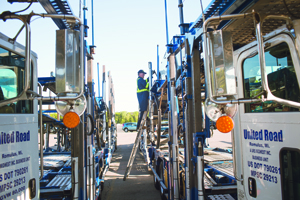Takeaway: The Road Ahead

Trucking companies continue to deal with an avalanche of safety and environmental regulations while bracing for potential disruption from new technology and changes in shipping patterns.
“Our industry continues to get bombarded with regulation,” said Britt Colley, president of Epes Carriers Inc., a truckload and logistics service provider based in Greensboro, North Carolina.
Colley said electronic logs “are the next major game changer for our industry.”
A federal mandate to use electronic logs to keep track of driver hours is set to take effect next year. That change, along with regulatory initiatives on sleep apnea and driver training, is expected put pressure on carriers by reducing the availability of drivers, said executives interviewed for Transport Topics’ 2016 Top 100 For-Hire Carriers list.
“It seems clear that those making the rules are not considering the layering effect of all these federal, state and local requirements,” said Kathleen McCann, CEO of United Road, a car hauler based in Romulus, Michigan. “It adds up and is driving people out of the business.”
The for-hire TT100 annual publication, which includes special coverage of trucking in Mexico and revenue data for 223 carriers in 11 trucking sectors, is available online here.
Meanwhile, at Covenant Transport Group President Joey Hogan is partnering with a fitness coach to help new drivers overcome medical issues that could prevent them from driving.
As many as 70,000 commercial truck and bus drivers have been disqualified since 2014 due to medical problems, and 212,000 out of 8.5 million CDL holders are driving under temporary licenses, according to the Federal Motor Carrier Safety Administration.
The need to attract more drivers is forcing some companies, such as Celadon Group and CRST International, to ramp up training activities while driver training schools scramble to find more people who are interested and can meet federal standards for holding a commercial driver license.
To help carriers meet the challenge of finding and retaining drivers, manufacturers are developing trucks with autonomous capabilities, while shippers, such as Amazon.com, are seeking new ways to deliver products direct to consumers from local and regional fulfillment centers.
With lower fuel surcharges holding down revenue, many of the largest trucking companies in the United States and Canada are eying acquisitions to grow and diversify their businesses. Top-ranked UPS Inc., No. 2 FedEx Corp. and No. 3 XPO Logistics all made significant acquisitions during the past year.

